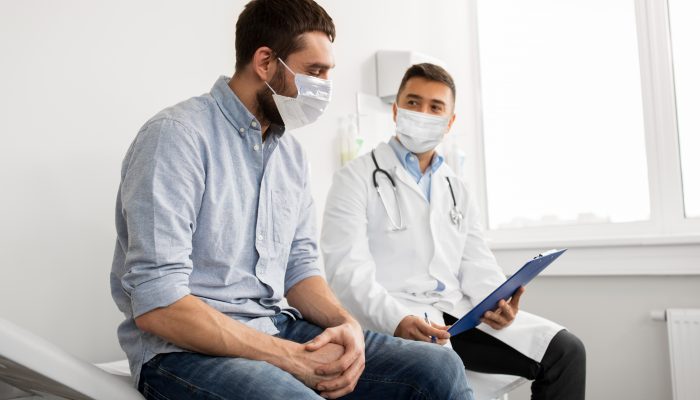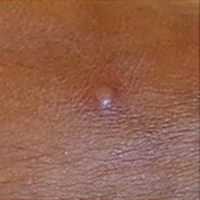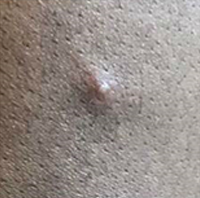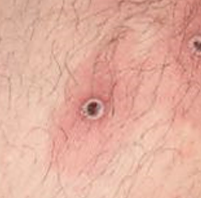
July 28, 2022 Update
Due to a lack of vaccines received, the number of monkeypox vaccine appointments is EXTREMELY LIMITED at this time. While the eligibility criteria listed below is still in effect, vaccine doses are prioritized for those at the highest risk. People who are at the highest risk of getting monkeypox are those who have been exposed. As more vaccine doses are received, the Health Department will be able to vaccinate more eligible people.
What is monkeypox?
Monkeypox is a viral disease that is usually found in Central and West Africa. Monkeypox was first discovered in laboratory monkeys in 1958. In 1970, Monkeypox was reported in humans for the first time. Monkeypox can be fatal, but that’s rare and has never happened in the United States.
What does it look and feel like?
For some people, monkeypox can start off feeling like the flu: fever, swollen lymph nodes, and just feeling unwell. Not everyone gets these symptoms though.
People who have monkeypox will start to see a rash or lesions (they look like bumps) develop within a couple of weeks after being exposed. The lesions can show up anywhere on the body including on the face, in the mouth, or on or around the genitals or anus. The lesions can be very subtle and people might only notice one or two lesions.
Some people report that the lesions can be very painful. Other people say that they can be mild.
These are some examples of what monkeypox lesions look like:



How can you get monkeypox?
People who are in close, personal contact with someone who has monkeypox can get it from them. There are several ways that it could spread. It can spread:
- If you touch the rash, the scabs of the lesions, or body fluids of someone who has monkeypox,
- If you have close personal contact, like kissing, cuddling, or sex, with someone who has monkeypox,
- If you touch things like clothes or bed sheets that have touched the rash or body fluids of someone who has monkeypox,
- From a pregnant person to their fetus.
You can get monkeypox from someone else as soon they have a fever or feel unwell or have a lesion. They can give it to someone else the entire time they have a rash until the lesions have scabbed over, fallen off, and new skin has grown back. This can take up to a month.
Who can get monkeypox?
Anyone who is exposed to monkeypox can get it. Some groups of Philadelphians are at a higher risk of being exposed to monkeypox. The current outbreak of monkeypox has been found more often in men who have sex with men who have had multiple partners in the past few weeks. So people with potential risky exposures should take extra precautions to protect themselves.
How can you protect yourself?
The best way to protect yourself from monkeypox is to not be exposed to it. That means that you should ask your partner:
- Have you been around someone who had monkeypox?
- Are you feeling sick?
- Do you have a rash or lesions on your body?
If they answer yes to any of those questions, you should avoid close contact and use gloves or avoid touching things that they have touched. Wash your hands frequently with soap and water or use hand sanitizer frequently.
What should you do if you think you were exposed to monkeypox?
If you think that you were exposed to monkeypox, you should call the Health Department at 215-685-5488 to tell them you may have been exposed to monkeypox.
What happens when you’re exposed?
If a person is exposed to someone with monkeypox, they should call the Health Department at 215-685-5488 to tell them you may have been exposed to monkeypox immediately. The Health Department will ask about the exposure and work with that person to set up an opportunity to receive a vaccine to help keep from getting monkeypox. The vaccine must be provided as soon as possible, so making this call quickly is important. Vaccine is being distributed first to those at the highest-risk, so people who may be lower-risk might not get an immediate vaccine appointment.
What should you do if you have symptoms?
If a person has symptoms of monkeypox, including a rash or lesions, they should call their regular healthcare provider immediately. If they don’t have a healthcare provider, they can visit https://findahealthcenter.hrsa.gov to find a public health clinic or visit an urgent care facility.
People who are experiencing symptoms of monkeypox or have been diagnosed with monkeypox cannot be vaccinated.
The healthcare provider will order a test for the virus. If they send the test to a private lab, the patient may be charged for it. If this test comes back positive, they likely have monkeypox. That person should talk with their healthcare provider to see if treatment is needed. The Health Department will also contact that person to ask about people that they may have exposed to monkeypox.
It’s important that some people’s symptoms of monkeypox are very mild and they might not notice it right away. If you think you may have been exposed and something feels wrong, contact your healthcare provider. You should also consider letting any partners know that you might have monkeypox, to help protect them.
What about monkeypox vaccine?
The Health Department has received a small supply of JYNNEOS vaccine from the federal government. The vaccine is for people who have not tested positive for monkeypox.
This vaccine usually only has minor reactions like pain, swelling, and redness at the site of injection. This vaccine is safe for people with HIV.
There is no charge for receiving monkeypox vaccine.
How many doses of monkeypox vaccine do you need?
The JYNNEOS vaccine is administered in two doses at least four weeks apart.
While JYNNEOS requires two doses before individuals are considered fully vaccinated, a single dose can still offer protection. This protective strategy is being adopted in the UK, Canada, and New York City. Because of an increase of cases in Philadelphia and a limited supply of vaccine, the Health Department will also follow this single dose vaccination strategy. Providing first doses to at-risk individuals is the best way to provide protection to Philadelphians until the city receives further vaccine supply.
This strategy is supported by the available scientific evidence, demand for vaccine, and JYNNEOS vaccine shortage. This could mean that individuals may not receive their second dose by the 28-day interval between doses as is indicated in the FDA prescribing label. This possible delay will not negatively affect the immune response to the second dose. The Health Department will communicate to people who have received first doses about when second doses are available and how to receive them.
How can you get vaccinated against monkeypox?
Beginning July 25, 2022, the Health Department and select health clinics began administering vaccine to people who are at high-risk of exposure but may not have been exposed. The eligibility criteria can be found below.
The Health Department and select providers will be vaccinating people at invite-only clinics. The invite-only clinics will not allow walk-ins and will not allow people to set appointments. Non-Health Department clinics are sending invitations to their current high-risk patients. The Health Department is sending invitation to people who are known contacts of people who have monkeypox or who have been identified in existing Health Department databases as someone who could be at a higher risk of being exposed to monkeypox without knowing it.
The Health Department also allows people who are concerned that they’ve been exposed, or believe they are at high risk of being exposed to monkeypox, to call a Call Center at 215-685-5488 to see if they are eligible to be vaccinated. People are considered to be at high-risk of exposure when they meet these criteria:
People who meet ALL of the following conditions:
- Gay, bisexual, transgender, non-binary, and other men who have sex w/men, transgender, or non-binary persons, and
- Age 18 or older;
AND
Meet ONE of the following criteria:
- Have had multiple or anonymous sex partners in the last 14 days and/or believe they may have been exposed to an STI or monkeypox in the past 14 days,
OR
- Have had any newly diagnosed STI in the past 3 months, including gonorrhea, chlamydia, early syphilis, or HIV.
Vaccine is being distributed first to those at the highest-risk, so people who may be lower-risk might not get an immediate vaccine appointment. As more vaccine is delivered, more people will be invited to these vaccine clinics.
During the COVID-19 vaccine program, we learned that opening vaccine clinics to everyone meant that only those who were internet-savvy and had time to spare would get their vaccines first. People who really needed the vaccine could not get it or had to wait in long lines. By limiting who gets vaccine to those at the highest risk of getting monkeypox, we know that the vaccine will get to those most in need right away.
Where can you learn more?
The CDC has been responding to this outbreak and is tracking where people are getting sick. They have lots of information available about monkeypox, vaccine, antivirals available on their website. Here are some good resources from them: